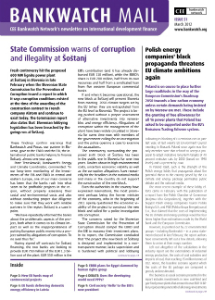EBRD plans for Egypt slammed by human rights group

Bankwatch Mail | 13 March 2012
An independent Egyptian human rights organisation, the Egyptian Initiative for Personal Rights (EIPR), published in early March a scathing assessment of the EBRD’s plans for its future investment activities in Egypt. Based on an EBRD Technical Assessment document, EIPR takes issue with the EBRD analysis on three main counts:
- first, what EIPR describes as EBRD’s “aggressive privatization agenda”, that the group asserts, “simply ignores the social turmoil that was caused by far milder versions of privatization”, with EBRD privatization intentions for sectors such as fresh water, roads and electricity particularly questioned;
- second, EIPR calls into question the EBRD’s very commitment to ‘development’, predicated as it is on a strong private sector emphasis as well as infrastructure and energy projects, with, EIPR says, “no mention at all of human development areas such as poverty eradication and gender equality”, and;
- third, according to EIPR, “even though the assessment does bring up terms such as ‘good governance’, the rule of law and contract enforcement, it fails to address the institutional deficit from which Egypt suffers.” Citing the current difficult Egyptian conditions for building institutions, including the enduring legacy of corrupt and crony capitalism from the Mubarak era, EIPR questions why the EBRD’s political assessment of Egypt’s transition offers nothing in regard to “prospective labor rights and the freedom to establish independent unions”.
Running through the EIPR critique is a sense of grievance that, despite EBRD claims to have consulted widely in the country, the bank is offering little that differs from the ‘old mindset’ of top-down prescriptions and intentions for the future. EIPR states witheringly: “The EBRD seems to replicate the same old priorities set by the ousted regime and supported by IFIs (international financial institutions). In summation, the EBRD’s vision of development through the unconditional support of the private sector becomes a new version of the mythical ‘trickle-down effect’ that simply never takes place. The revolution was the end result of failed development that exacerbated income inequality and excluded the majority from the economy’s high growth rates.”
The process
As set out by the EBRD, it expects to follow a three-phase process in becoming active in Egypt. In the first phase, the EBRD’s Board of Directors would consider the use of cooperation funds; in the second phase, once an amendment of one of the EBRD’s founding articles has been accepted by members, the EBRD’s Board of Governors would consider the use of Special Fund resources for special operations; in the third phase, once the amendment of a further founding article has been accepted by members, the Board of Governors would consider granting recipient country status to Egypt and therefore allow the use of ordinary capital resources for ordinary operations. The Technical Assessment commented on by EIPR has been prepared in order to allow the Board of Directors to make an informed decision at the first stage of the process.
Find out more
The EIPR analysis can be viewed via this press release.
Watch Mark Fodor, Bankwatch’s Executive director, speak to Egyptian civil society about the EBRD’s plans for Egypt during a Bankwatch mission to Cairo in December 2011.
Never miss an update
We expose the risks of international public finance and bring critical updates from the ground. We believe that the billions of public money should work for people and the environment.
STAY INFORMED
